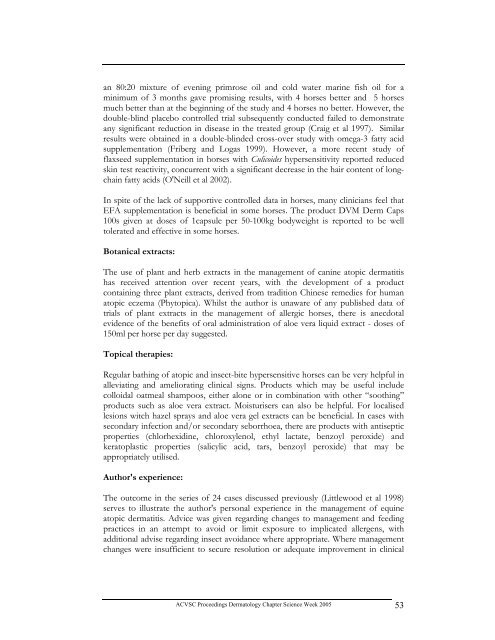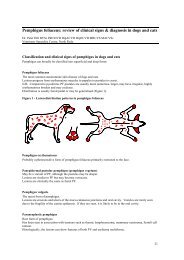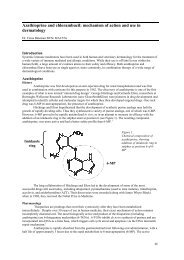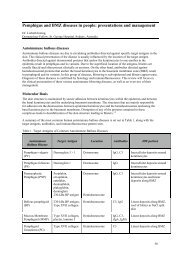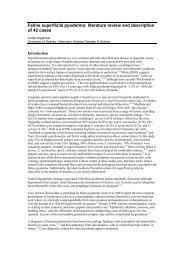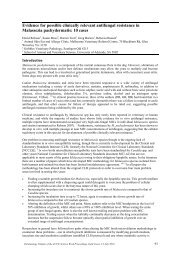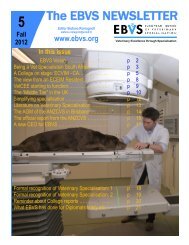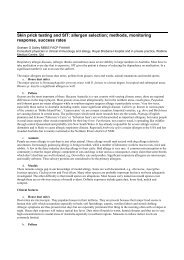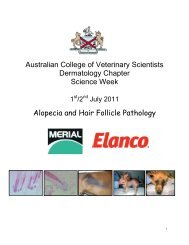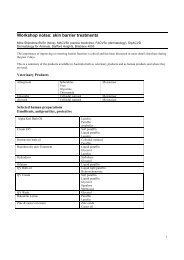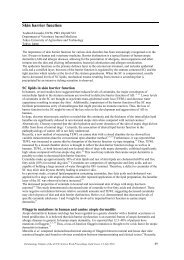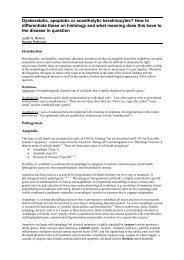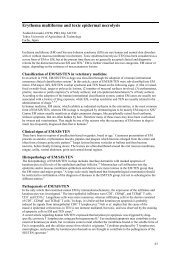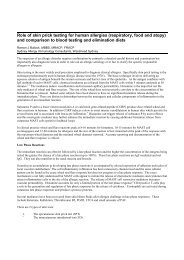here - Australian College of Veterinary Scientists
here - Australian College of Veterinary Scientists
here - Australian College of Veterinary Scientists
Create successful ePaper yourself
Turn your PDF publications into a flip-book with our unique Google optimized e-Paper software.
an 80:20 mixture <strong>of</strong> evening primrose oil and cold water marine fish oil for a<br />
minimum <strong>of</strong> 3 months gave promising results, with 4 horses better and 5 horses<br />
much better than at the beginning <strong>of</strong> the study and 4 horses no better. However, the<br />
double-blind placebo controlled trial subsequently conducted failed to demonstrate<br />
any significant reduction in disease in the treated group (Craig et al 1997). Similar<br />
results were obtained in a double-blinded cross-over study with omega-3 fatty acid<br />
supplementation (Friberg and Logas 1999). However, a more recent study <strong>of</strong><br />
flaxseed supplementation in horses with Culicoides hypersensitivity reported reduced<br />
skin test reactivity, concurrent with a significant decrease in the hair content <strong>of</strong> longchain<br />
fatty acids (O'Neill et al 2002).<br />
In spite <strong>of</strong> the lack <strong>of</strong> supportive controlled data in horses, many clinicians feel that<br />
EFA supplementation is beneficial in some horses. The product DVM Derm Caps<br />
100s given at doses <strong>of</strong> 1capsule per 50-100kg bodyweight is reported to be well<br />
tolerated and effective in some horses.<br />
Botanical extracts:<br />
The use <strong>of</strong> plant and herb extracts in the management <strong>of</strong> canine atopic dermatitis<br />
has received attention over recent years, with the development <strong>of</strong> a product<br />
containing three plant extracts, derived from tradition Chinese remedies for human<br />
atopic eczema (Phytopica). Whilst the author is unaware <strong>of</strong> any published data <strong>of</strong><br />
trials <strong>of</strong> plant extracts in the management <strong>of</strong> allergic horses, t<strong>here</strong> is anecdotal<br />
evidence <strong>of</strong> the benefits <strong>of</strong> oral administration <strong>of</strong> aloe vera liquid extract - doses <strong>of</strong><br />
150ml per horse per day suggested.<br />
Topical therapies:<br />
Regular bathing <strong>of</strong> atopic and insect-bite hypersensitive horses can be very helpful in<br />
alleviating and ameliorating clinical signs. Products which may be useful include<br />
colloidal oatmeal shampoos, either alone or in combination with other “soothing”<br />
products such as aloe vera extract. Moisturisers can also be helpful. For localised<br />
lesions witch hazel sprays and aloe vera gel extracts can be beneficial. In cases with<br />
secondary infection and/or secondary seborrhoea, t<strong>here</strong> are products with antiseptic<br />
properties (chlorhexidine, chloroxylenol, ethyl lactate, benzoyl peroxide) and<br />
keratoplastic properties (salicylic acid, tars, benzoyl peroxide) that may be<br />
appropriately utilised.<br />
Author's experience:<br />
The outcome in the series <strong>of</strong> 24 cases discussed previously (Littlewood et al 1998)<br />
serves to illustrate the author's personal experience in the management <strong>of</strong> equine<br />
atopic dermatitis. Advice was given regarding changes to management and feeding<br />
practices in an attempt to avoid or limit exposure to implicated allergens, with<br />
additional advise regarding insect avoidance w<strong>here</strong> appropriate. W<strong>here</strong> management<br />
changes were insufficient to secure resolution or adequate improvement in clinical<br />
ACVSC Proceedings Dermatology Chapter Science Week 2005 53


